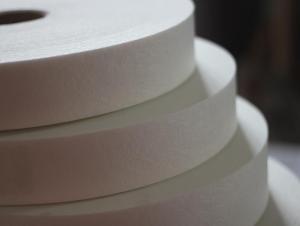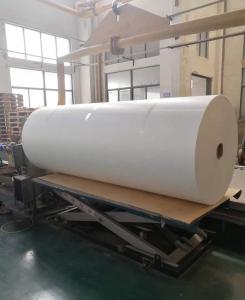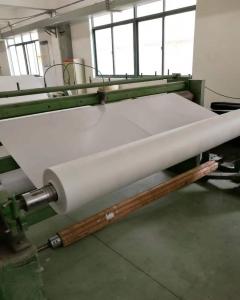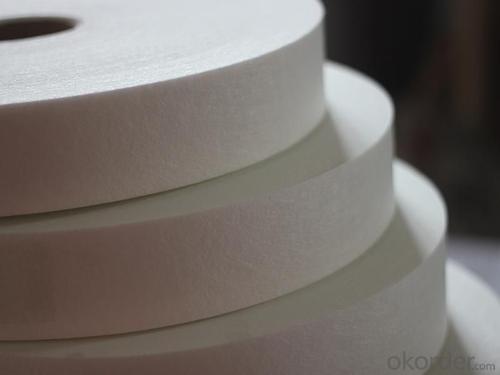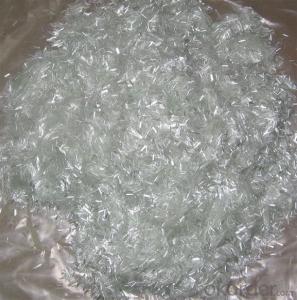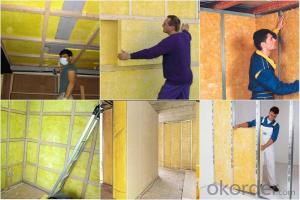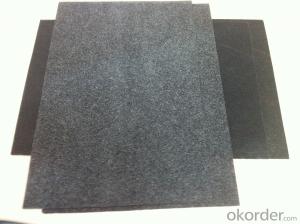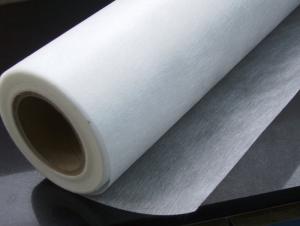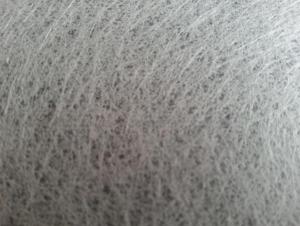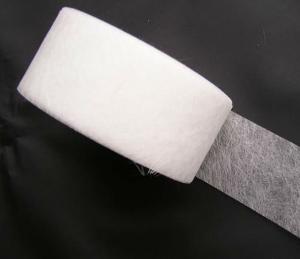C GLASS SURFACING VEIL 30GSM FIBERGLASS TISSUE
- Loading Port:
- Shanghai
- Payment Terms:
- TT or LC
- Min Order Qty:
- 7200 m²
- Supply Capability:
- 10000000 m²/month
OKorder Service Pledge
OKorder Financial Service
You Might Also Like
Material Description: C-Glass Surfacing Veil
It is mainly suitable for winding FRP pipes and tank products,which significantly improves the corrosion resistance, leakage resistance, compressive strength and appearance quality of the surface layer of the product. , prolong its service life.
Application: Used as surfacing veil for Pipes, Liners, Tank shells & Lamination
Table 1: Specification | |||
Property | Test Method | Unit | Specification |
Area Density | ISO 3374 | g/m2 | 30±3 |
Loss on Ignition | ISO 1887 | % | 6±2 |
Moisture Content | ISO 3344 | % | <=0.5 |
Tensile Strength MD | ISO 9073-3 | N/50mm | >=40 |
Wetting Speed | - | S | <=10 |
Width | - | MM | Min : 45, Max: 3100 |
Visual Appearance | - | - | White Surfacing Veil |
Compatibility | - | - | Unsaturated Polyester, Vinylester & Epoxy resins |
Package:
Each roll will be in the carton box then packed on the pallet,each pallet wrapped in PVC/PE film.
E. g. 30GSM-1000MM:20 Pallets/20GP
9 Rolls/Pallet,Pallet size will be:L1.12M*W1.12M*H1.15M
Storage:
It should be stored in a ventilated, dry and clean warehouse, stacked neatly, and it should not be squeezed, deformed or damaged, and the distance from the heat source should not be less than 2 meters.
- Q: Is fiberglass mat tissue easy to install?
- Installing fiberglass mat tissue is relatively easy. This lightweight and flexible material can be easily cut and shaped to fit any surface. It can be applied using different methods, including spraying, rolling, or brushing on adhesive. Moreover, the tissue is self-adhesive, which simplifies the installation process as it readily adheres to the desired surface. Additionally, fiberglass mat tissues are generally designed to resist water and offer excellent insulation, making them a favored choice for various applications. In conclusion, by adequately preparing and following the manufacturer's guidelines, installing fiberglass mat tissue can be a simple and trouble-free task.
- Q: Can fiberglass mat tissue be used for making lightweight panels?
- Yes, fiberglass mat tissue can be used for making lightweight panels. Fiberglass mat tissue is a thin and lightweight material made from fine glass fibers, which are bonded together with a resinous binder. This material is commonly used in the construction industry to reinforce surfaces and provide strength to various applications. When used in panel manufacturing, fiberglass mat tissue can be an excellent choice for producing lightweight panels. The thin and flexible nature of the material allows it to be easily incorporated into panels without adding significant weight. Additionally, fiberglass mat tissue has excellent strength properties, which can contribute to the overall structural integrity of the panels. Furthermore, fiberglass mat tissue can provide insulation and soundproofing properties to the panels, making them suitable for applications where these characteristics are required. The material is also resistant to corrosion and moisture, which enhances the durability and longevity of the panels. Overall, fiberglass mat tissue is a versatile and lightweight material that can be effectively used for making lightweight panels. Its strength, flexibility, insulation properties, and resistance to corrosion and moisture make it a suitable choice for various applications in industries such as construction, automotive, aerospace, and marine.
- Q: How does fiberglass mat tissue perform in terms of thermal conductivity?
- Fiberglass mat tissue exhibits excellent thermal conductivity performance. Its fine glass fibers composition contributes to a low thermal conductivity value, resulting in effective heat transfer insulation. The interwoven fibers form a barrier that hinders heat movement, making it a highly suitable material for thermal insulation purposes. Moreover, the mat tissue is frequently combined with binders or coatings to enhance its thermal resistance characteristics. In summary, fiberglass mat tissue is a dependable option for reducing thermal conductivity and delivering insulation across diverse industries and applications.
- Q: Is fiberglass mat tissue biodegradable?
- Fiberglass mat tissue does not possess biodegradable properties. It is an artificial substance composed of delicate glass fibers intricately interwoven to form a resilient and long-lasting material. These fibers do not undergo natural decomposition, rendering fiberglass mat tissue to be non-biodegradable.
- Q: How is fiberglass mat tissue used in the production of composite panels?
- Fiberglass mat tissue is used in the production of composite panels as a reinforcement material. It is typically placed between layers of resin to provide strength, stability, and impact resistance to the panel. The fiberglass mat tissue helps to distribute the load evenly across the composite structure, making it more durable and capable of withstanding various external forces.
- Q: Does anyone know the hardness value of the heat conductive gasket? Does it contain the hardness of the carrier (glass fiber)?
- The hardness of the heat conducting gasket does not contain the hardness of the carrier glass fiber.
- Q: What is the flexibility of fiberglass mat tissue?
- The flexibility of fiberglass mat tissue is high, as it can easily bend and conform to different shapes and surfaces without breaking or losing its structural integrity.
- Q: Is fiberglass mat tissue suitable for insulation in food processing facilities?
- Fiberglass mat tissue is not suitable for insulation in food processing facilities. This material is typically used as a reinforcement in composites, such as roofing and construction materials, and is not designed to meet the specific requirements of food processing environments. Food processing facilities require insulation materials that are safe, durable, and compliant with strict health and safety regulations. Fiberglass mat tissue does not possess these characteristics and may pose potential risks to food safety. Instead, it is recommended to use insulation materials specifically designed for food processing facilities. These materials should be non-toxic, resistant to moisture, mold, and bacteria, and should be able to withstand high temperatures and frequent cleaning and sanitization procedures. Examples of suitable insulation materials for food processing facilities include closed-cell foam, mineral wool, and polyisocyanurate (PIR) foam. These materials have been extensively tested and proven to meet the necessary standards and regulations for use in food processing environments. It is crucial to prioritize the safety and hygiene of food processing facilities, and therefore, it is advisable to consult with experts or insulation specialists who can provide guidance on the most suitable and compliant insulation options for such facilities.
- Q: What is the thermal stability of fiberglass mat tissue?
- The ability of fiberglass mat tissue to endure high temperatures without significant degradation or loss of physical properties is referred to as its thermal stability. Fiberglass mat tissue is typically crafted from woven or non-woven glass fibers, renowned for their exceptional resistance to heat. Depending on the specific type and composition, fiberglass mat tissue can generally withstand temperatures ranging from approximately 100°C (212°F) to 500°C (932°F). At these temperatures, the glass fibers retain their strength, dimensional stability, and insulation properties. The thermal stability of fiberglass mat tissue holds great importance in diverse applications where exposure to high temperatures is anticipated. For instance, it is commonly employed in the construction industry for insulation purposes in buildings. This is because it has the capability to endure the heat generated by HVAC systems or fire. Furthermore, the thermal stability of fiberglass mat tissue is also vital in industries such as automotive, aerospace, and marine. In these industries, it is utilized for heat shielding, fire protection, and insulation in engine compartments, exhaust systems, and other environments with elevated temperatures. In conclusion, the thermal stability of fiberglass mat tissue establishes it as a dependable and long-lasting material choice for applications necessitating resistance to high temperatures. Its capacity to preserve its properties under extreme heat conditions guarantees enduring performance and safety across various industries.
- Q: Can fiberglass mat tissue be used for reinforcing concrete?
- Yes, fiberglass mat tissue can be used for reinforcing concrete. Fiberglass mat tissue is a lightweight and flexible material that is often used in construction projects to enhance the strength and durability of concrete structures. It can be embedded within the concrete to provide additional reinforcement and prevent cracks from forming over time. The fiberglass mat tissue is typically made from high-quality glass fibers that are woven together to form a strong and stable material. Its excellent tensile strength and resistance to corrosion make it an ideal choice for reinforcing concrete and improving its overall performance. Whether it is used in sidewalks, driveways, or other concrete structures, fiberglass mat tissue can significantly enhance the strength and longevity of the concrete.
Send your message to us
C GLASS SURFACING VEIL 30GSM FIBERGLASS TISSUE
- Loading Port:
- Shanghai
- Payment Terms:
- TT or LC
- Min Order Qty:
- 7200 m²
- Supply Capability:
- 10000000 m²/month
OKorder Service Pledge
OKorder Financial Service
Similar products
Hot products
Hot Searches
Related keywords
